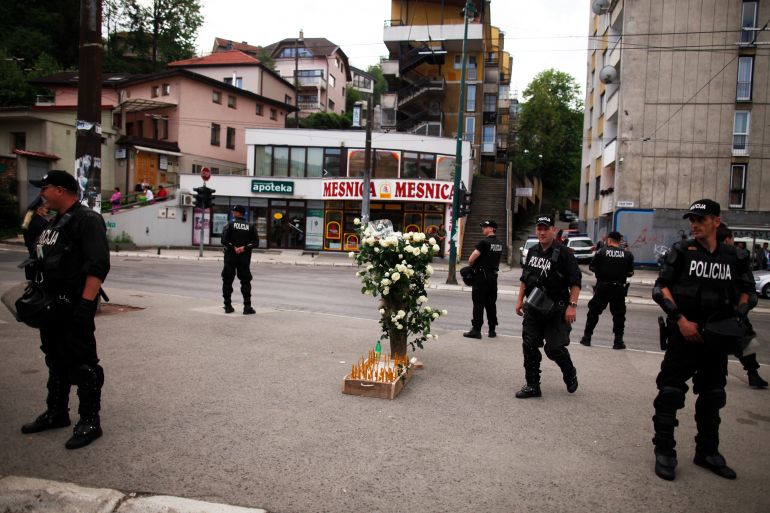Sarajevo court charges Bosniak ex-leaders with war crimes
Ten people have been charged for their alleged role in the killing of retreating Yugoslav army soldiers in 1992.

Several former Bosniak political and military leaders have been charged with war crimes for their alleged role in the killing of retreating Yugoslav army soldiers at the start of the Bosnian war in the early 1990s.
Sarajevo prosecutors on Wednesday charged 10 people for their involvement in the 1992 attack on a retreating Yugoslav People’s Army (JNA) convoy, which was being escorted along Sarajevo’s Dobrovoljacka Street by United Nations peacekeepers.
Keep reading
list of 4 items‘A camera doesn’t lie’: Documenting besieged Sarajevo
The Love of Books: The Brave Librarians of Sarajevo
Holiday Inn Sarajevo: In the Eye of the Siege
The suspects include Ejup Ganic, a member of Bosnia’s war-time presidency, two former interior ministers, and several retired Bosnian army generals.
Ganic and his co-accused are suspected of having “planned, attacked and incited [others to attack] the undefended convoy … escorted by the UN peace forces”, as well as having failed to either prevent the killings or punish the perpetrators of the attack, the prosecutors said.
Eight Yugoslav soldiers, civilian employees, and military medical staff were killed and 24 wounded, according to the indictment.
The attack on May 3, 1992, took place two months after Bosnia and Herzegovina voted for independence from Yugoslavia in a referendum, and followed a day after a barrage of shelling of central Sarajevo by Yugoslav army artillery and Bosnian Serb forces.
The war in Bosnia killed nearly 100,000 including more than 11,500 people in Sarajevo by Serb forces who besieged the capital in April 1992.
In 2012, the same prosecutors suspended an investigation of Ganic and 13 former Bosniak wartime leaders for the alleged war crime. The acting international prosecutor at that time had assessed that no war crime was committed as the convoy was a “legitimate military target”.
The state prosecutors said on Wednesday that they had conducted a thorough investigation together with the State Investigation and Protection Agency, and with the Ministry of Internal Affairs of Bosnia’s Republika Srpska entity.
Vahid Alic, president of the Green Berets association – a former Bosniak paramilitary group, told Al Jazeera Balkans in 2017 that the agreement for the withdrawal of the Yugoslav army convoy that was attacked in 1992 was that the troops and commander withdraw without weapons.
“Unfortunately, this was not respected on May 3,” Alic claimed.
“Passing through the former Dobrovoljacka Street, members of the JNA opened fire on citizens and fighters who were ensuring passage for the convoy,” he said.